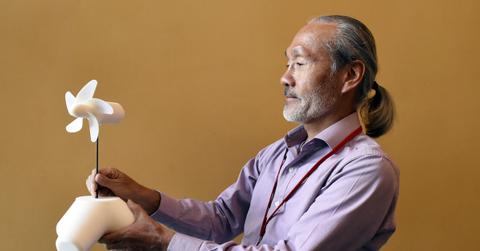Scientists Think They Can Get Energy From Ocean Waves
Tsumoru Shintake has invented a turbine that converts wave energy into clean electricity currently powering hotels.
May 31 2019, Updated 12:15 p.m. ET
The ocean already provides a home for countless creatures and a perfect backdrop for days at the beach. But what if it could also provide energy?
Tsumoru Shintake believes he has found a way to harness power from ocean waves. In a new Bloomberg profile, the quantum physicist explains his revolutionary invention, a turbine that draws energy from wave currents.
“The ocean is big and beautiful,” Shintake says in the article. “We can use its energy.”
Shintake’s device, which he calls a wave energy converter, is a small white turbine with flexible blades. It sits near the shoreline, where ocean waves can crash against it. The wave energy converter collects power from these cresting waves, then converts it into clean electricity, which is run back to the mainland.
Shintake’s turbines provide the same amount of power as a standard diesel generator, and its potential is already being put to use at the Holiday Inn Resort in Kandooma, an island in the Maldives.
Shintake and his investor, Kohei Yamashita, have been testing the wave energy converters at the hotel since May. Right now, Shintake claims two mini-turbines are generating enough power for one guest room, but the pair hopes to expand the scope over the next two years, with the ultimate goal of supplying a third of the resort’s energy.
It’s taken Shintake nearly six years to get to this point. He first began experimenting with an underwater turbine concept in 2012 at the Okinawa Institute of Science and Technology, where Shintake is a professor. His research project name? “Sea Horse.”
Working with a team of OIST scientists, Shintake anchored the turbines to the Kuroshio sea floor with cables. The wave energy converters were able to collect, convert, and deliver power back to the land, but there was a problem with Shintake’s initial test: the turbines were too far out in the ocean.
Positioning the wave energy converts deep in the sea required long, expensive cables to carry the electricity back to shore. It was also hard to maintain and repair the system from such a distance. “The idea was great, but the reality was hard,” Shintake tells Bloomberg. “In the end, I didn’t think it could be done this century.”
So Shintake scaled back his invention to something smaller that could live a little closer to land. It cost him just $10,000 to build his updated turbine, and he soon received a major cash influx from Yamashita, a real estate mogul who poured $100,000 into the project after he saw Shintake’s device on television.
“There was this professor in the water doing something intriguing,” Yamashita recalls to Bloomberg. “I had to contact him.”
He and Shintake met in 2016, going into business together after a diving trip to the Maldives. Yamashita was able to use his government contacts to broker the deal with Holiday Inn.
Shintake says a bigger turbine will be ready for the resort before Christmas, but that a still more powerful prototype, the “real one” will be introduced next summer. If tests go well, the turbines could potentially replace dirty power sources in other part of the Maldives and coastal communities around the world.
“I’m imagining the planet two hundred years later,” Shintake says in an OIST press release. “I hope these [turbines] will be working hard quietly, and nicely, on each beach on which they have been installed.”


